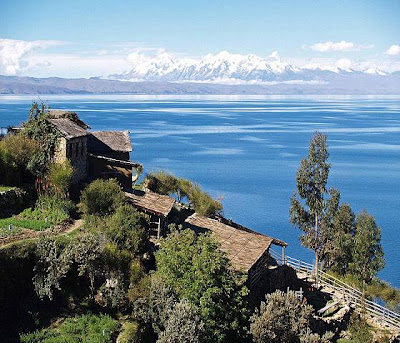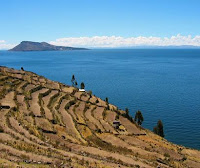Lake Titicaca is a lake located on the border of Peru and Bolivia. It sits 3,811 m above sea level making it the highest commercially navigable lake in the world. By volume of water it is also the largest lake in South America. The details of Lake Titicaca are explained in world tour guides below.
 The lake is located at the northern end of the endorheic Altiplano basin high in the Andes on the border of Peru and Bolivia. The western part of the lake lies within the Puno Region of Peru, and the eastern side is located in the Bolivian La Paz Department. The lake is composed of two nearly separate sub-basins that are connected by the Strait of Tiquina which is 800 m across at the narrowest point. The larger sub basin Lago Grande has a mean depth of 135 m and a maximum depth of 284 m. The smaller sub basin Winaymarka has a mean depth of 9 m and a maximum depth of 40 m. The overall average depth of the lake is 107 m.
The lake is located at the northern end of the endorheic Altiplano basin high in the Andes on the border of Peru and Bolivia. The western part of the lake lies within the Puno Region of Peru, and the eastern side is located in the Bolivian La Paz Department. The lake is composed of two nearly separate sub-basins that are connected by the Strait of Tiquina which is 800 m across at the narrowest point. The larger sub basin Lago Grande has a mean depth of 135 m and a maximum depth of 284 m. The smaller sub basin Winaymarka has a mean depth of 9 m and a maximum depth of 40 m. The overall average depth of the lake is 107 m.Lake Titicaca is fed by rainfall and meltwater from glaciers on the sierras that abut the Altiplano. Five major river systems feed into Lake Titicaca. In order of their relative flow volumes these are Ramis, Coata, Ilave, Huancane and Suchez. More than 20 other smaller streams empty into Titicaca, and the lake has 41 islands, some of which are densely populated. The cold sources and winds over the lake give it an average surface temperature of 10 to 14 °C. In the winter mixing occurs with the deeper waters, which are always between 10 to 11 °C.
The origin of name Titicaca is unknown. It has been translated as Rock Puma for its resembling shape of a puma hunting a rabbit, combining words from the local languages Quechua and Aymara and as well as translated as Crag of Lead. The southeast quarter of lake is separate from main body the Bolivians calling it Lago Huinaymarca and larger part Lago Chucuito. In Peru these smaller and larger parts are referred to as Lago Pequeno and Lago Grande respectively. Titicaca is notable for a population of people who live on the Uros a group of 42 or so artificial islands made of floating reeds. These islands have become a major tourist attraction for Peru drawing excursions from lakeside city of Puno.
Amantani is another small island on Lake Titicaca populated by Quechua speakers. About 800 families live in six villages on the roughly circular 15 square kilometres island. There are two mountain peaks called Pachatata and Pachamama, and ancient ruins on the top of both peaks. The hillsides that rise up from the lake are terraced and planted with wheat, potatoes, and vegetables. Most of the small fields are worked by hand. Long stone fences divide the fields, and cattle, sheep, and alpacas graze on the hillsides.

 Taquile is a hilly island located 35 kilometres east of Puno. It is narrow and long and was used as a prison during the Spanish Colony and into the 20th century. In 1970 it became property of the Taquile people, who have inhabited the island. Pre Inca ruins are found on the highest part of the island, and agricultural terraces on hillsides. Situated on the Bolivian side of lake with regular boat links to Bolivian town of Copacabana, Isla del Sol is one of the lakes largest islands. Geographically, the terrain is harsh; it is a rocky, hilly island. There are no motor vehicles or paved roads on the island. The main economic activity of the approximately 800 families on the island is farming, with fishing and tourism augmenting the subsistence economy.
Taquile is a hilly island located 35 kilometres east of Puno. It is narrow and long and was used as a prison during the Spanish Colony and into the 20th century. In 1970 it became property of the Taquile people, who have inhabited the island. Pre Inca ruins are found on the highest part of the island, and agricultural terraces on hillsides. Situated on the Bolivian side of lake with regular boat links to Bolivian town of Copacabana, Isla del Sol is one of the lakes largest islands. Geographically, the terrain is harsh; it is a rocky, hilly island. There are no motor vehicles or paved roads on the island. The main economic activity of the approximately 800 families on the island is farming, with fishing and tourism augmenting the subsistence economy.Isla de la Luna is situated east from the bigger Isla del Sol. According to legends that refer to Inca mythology Isla de la Luna is where Viracocha commanded the rising of the moon. Ruins of a supposed Inca nunnery occupy the oriental shore. Suriqui lies in the Bolivian part of Lake Titicaca. Suriqui is thought to be the last place where the art of reed boat construction survives, at least as late as 1998. Craftsmen from Suriqui helped Thor Heyerdahl in the construction of several of his projects, such as the reed boats Ra II and Tigris, and a balloon gondola.







No comments:
Post a Comment